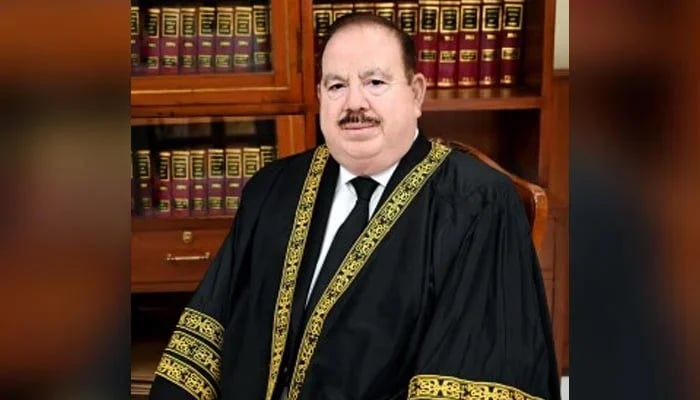SJC dismisses complaint against Justice Tariq
The Council held an extensive meeting and later on, uploaded its press release on its official website
ISLAMABAD: The Supreme Judicial Council (SJC) Monday dismissed a complaint against Justice Sardar Tariq Masood, ruling that it was filed maliciously to defame the senior Supreme Court judge.
Meanwhile, Justice Sayyed Mazahir Ali Akbar Naqvi challenged the SJC proceedings, terming complaint against him an attack on the independence of judiciary.
The Council met here at the Supreme Court, chaired by Chief Justice of Pakistan (CJP) Qazi Faez Isa. The Council members — Justice Ijazul Ahsen, Justice Syed Mansoor Ali Shah, Chief Justice Lahore High Court Justice Muhammad Ameer Bhatti and Chief Justice Balochistan High Court Justice Naeem Akhtar Afghan — attended the meeting.
The chief justice had convened the SJC to review the misconduct complaints filed against Justice Sardar Tariq Masood and Justice Sayyed Mazahir Ali Akbar Naqvi. One Amna Malik had filed a misconduct complaint against Justice Sardar Tariq, while the Pakistan Bar Council (PBC) and Mian Dawood advocate filed complaints against Justice Mazahir Naqvi.
The Council held an extensive meeting and later on, uploaded its press release on its official website. The Council dismissed the complaint filed against Justice Sardar Tariq Masood and held that it was filed maliciously to defame the judge. “The complainant herself has stated that her complaint should not have been filed as the allegations were not correct”, says the press release adding, “There is no substance in the complaint and we are of the opinion that it was filed maliciously to defame Justice Sardar Tariq Masood”.
It added: “The complaint is dismissed and the question whether the complainant should be proceeded against for filing a false complaint will be considered later.”
The press release further said the statement on oath of the complainant, Mrs Amna Malik, was recorded and she was questioned. It said the complainant’s complaint filed against Justice Sardar Tariq Masood was exhibited as A, a notice of the Secretary, Supreme Judicial Council, calling upon the complainant to provide material in support of her complaint was exhibited as B, the complainant’s letter in response as C-1, and attachments thereto as C-2 and C-3.
The Council further mentioned that Justice Sardar Tariq Masood was issued a notice to be in attendance if he wanted to rebut the allegations levelled against him and he filed his response as exhibit D-1 and the attachments thereto as exhibits D-2 to D-13. “The complainant was questioned and gave unsatisfactory answers and withheld information”, the press release said, adding that the complainant had conceded that her complaint was not justified in view of the documents seen by her.
It further stated that Justice Sardar Tariq Masood had stated that he had been publicly defamed and as the complainant herself conceded that it was factually incorrect, he requested action against her and against M. Azhar Siddique, ASC, who had tweeted her complaint. “Justice Sardar Tariq Masood had also requested that since he was publicly defamed, he should be publicly exonerated too and that the order passed today as well as the examination of the complainant and answers to questions be disclosed and that he does not claim any confidentiality regarding it or in respect of his written response,” the press release further reads.
Regarding the request of Justice Sardar Tariq Masood, Clause 13 of the Supreme Judicial Council Procedure of Enquiry 2005 (the Procedure) stipulates that the proceedings of the Council shall be conducted in camera and shall not be open to the public. However, Clause 13(3) of the Procedure states that the proceedings, if so directed by the Council, can be reported. Accordingly, considering the request of Justice Sardar Tariq Masood, who wants public exoneration, the stated proceedings be reported by the Secretary of the Council and uploaded on the Supreme Court’s website.
“In view of the fact that the complaint was statedly tweeted by M. Azhar Siddique, ASC, notice be issued to him calling for his explanation within seven days whether he tweeted, and if he had, why should action in accordance with law not be taken against him or as recommended to be taken”, the SJC held.
In a related development, Supreme Court Judge Justice Sayyed Mazahir Ali Akbar Naqvi moved the Supreme Court against the complaints of misconduct filed against him with the Supreme Judicial Council (SJC), terming it a direct and blatant attack on the independence of judiciary.
Justice Naqvi filed a petition with the apex court under Article 184(3) of the Constitution through senior lawyers, including Khwaja Haris, Barrister Latif Khosa, Barrister Ali Zafar and Makhdoom Ali Khan. The petition made the Federation of Pakistan as respondents through the secretary of law and justice, the president of Pakistan through the Aiwan-e-Sadar Secretariat and Supreme Judicial Council (SJC) through its secretary.
Justice Naqvi prayed the apex court to declare the initiation of proceedings by the SJC coram non-judice, without lawful authority and of no legal effect and quash the same. He further prayed the apex court to declare that the purported show cause notice dated October 28, 2023 and the hearing notice dated November 13, 2023 were without lawful authority and of no legal effect and quash the same.
The judge submitted that he had been facing a malicious campaign since February 16, 2023 adding that false and baseless allegations had been openly and publicly levelled against him. “A media trial has been conducted while the malicious campaign and complaints are a direct and blatant attack on the independence of judiciary,” Justice Naqvi said, adding that these were violative of and inconsistent with the rights to access justice guaranteed under Article 4, 9 and 10-A of the Constitution.
Justice Naqvi said he reserved the right to urge further grounds and submit additional material in support at the time of the hearing. He questioned the very initiation of the proceedings by the SJC and the show-cause notice were without lawful authority, of no legal effect and in violation of Article 209 of the Constitution and the Rules as well as the legal and constitutional rights of the petitioner.
He also asked whether the show cause notice and the hearing notice fulfil the legal and constitutional requirements as laid down by the Supreme Court and whether the proceedings by the SJC and SC violate the principles of natural justice, due process and fair trial,” Justice Naqvi further questioned.
Similarly, Justice Naqvi questioned whether the participation of CJP Isa, Senior Puisne Judge Sardar Tariq Masood and Balochistan High Court Chief Justice Naeem Akhtar Afghan in the SJC proceedings resulting in the show cause notice being issued to the petitioner made all orders passed in such proceedings as without lawful authority and of no legal effect?
-
 Cardi B Finally Responds To Accusations About Destroying 'SNL' Set After Nicki Minaj Joke
Cardi B Finally Responds To Accusations About Destroying 'SNL' Set After Nicki Minaj Joke -
 Gorton And Denton By-election Result: Green Party Defeats Labour In Blow To Keir Starmer
Gorton And Denton By-election Result: Green Party Defeats Labour In Blow To Keir Starmer -
 Jack Dorsey Cuts 4,000 Roles, Says AI Requires Smaller Teams
Jack Dorsey Cuts 4,000 Roles, Says AI Requires Smaller Teams -
 Reggie Bannister Health Takes ‘difficult Turn’ Amid Dementia, Parkinson’s Battle
Reggie Bannister Health Takes ‘difficult Turn’ Amid Dementia, Parkinson’s Battle -
 'Humble Traitor' Rob Rausch Makes Unexpected Move After Betraying Maura Higgins In Season 4
'Humble Traitor' Rob Rausch Makes Unexpected Move After Betraying Maura Higgins In Season 4 -
 Sarah Ferguson Drops An Accusation Against Andrew? ‘He Just Wants Leverage’
Sarah Ferguson Drops An Accusation Against Andrew? ‘He Just Wants Leverage’ -
 Anthropic Rejects Pentagon Military AI Proposal, Holds Firm On Safety Guardrails —What’s Next?
Anthropic Rejects Pentagon Military AI Proposal, Holds Firm On Safety Guardrails —What’s Next? -
 'Traitors' Reunion Drama: Rob Rausch Defends Strategy, Makes Shocking Revelation After Victory
'Traitors' Reunion Drama: Rob Rausch Defends Strategy, Makes Shocking Revelation After Victory -
 Inside Hillary Clinton’s Epstein Testimony: Key Takeaways And Highlights Explained
Inside Hillary Clinton’s Epstein Testimony: Key Takeaways And Highlights Explained -
 'Too Hard To Be Without’: Woman Testifies Against Instagram And YouTube
'Too Hard To Be Without’: Woman Testifies Against Instagram And YouTube -
 Kendall Jenner Recalls Being ‘too Stressed’: 'I Want To Focus On Myself'
Kendall Jenner Recalls Being ‘too Stressed’: 'I Want To Focus On Myself' -
 Ethel Kennedy’s 34 Grandchildren And The Expanding Kennedy Family Legacy
Ethel Kennedy’s 34 Grandchildren And The Expanding Kennedy Family Legacy -
 Dolly Parton Achieves Major Milestone For Children's Health Advocacy
Dolly Parton Achieves Major Milestone For Children's Health Advocacy -
 'The White Lotus' Creator Mike White Calls 'Survivor' Fans 'sadistic'
'The White Lotus' Creator Mike White Calls 'Survivor' Fans 'sadistic' -
 Oilers Vs Kings: Darcy Kuemper Pulled After Allowing Four Goals In Second Period
Oilers Vs Kings: Darcy Kuemper Pulled After Allowing Four Goals In Second Period -
 Calgary Weather Warning As 30cm Snow And 130 Km/h Winds Expected
Calgary Weather Warning As 30cm Snow And 130 Km/h Winds Expected




